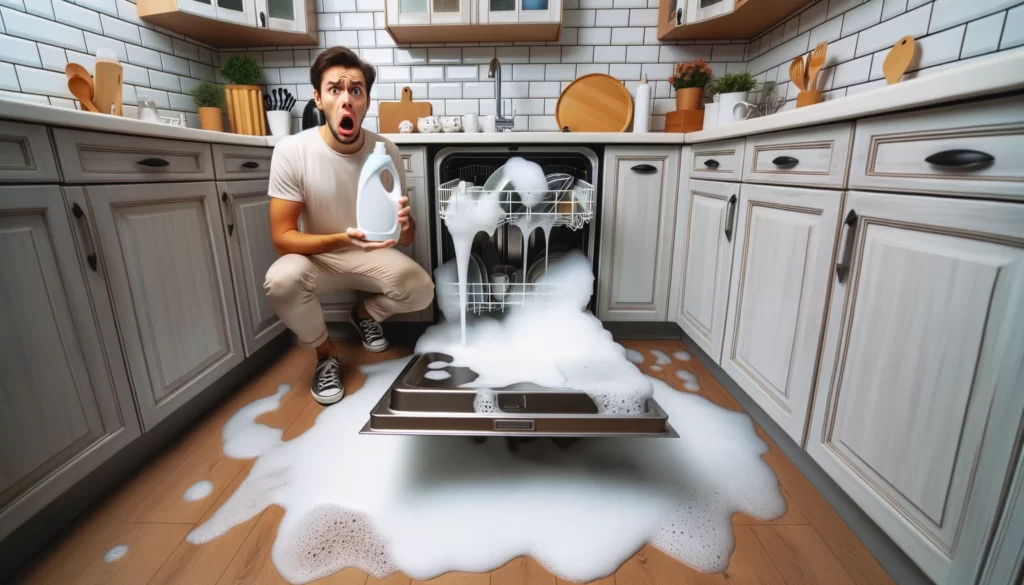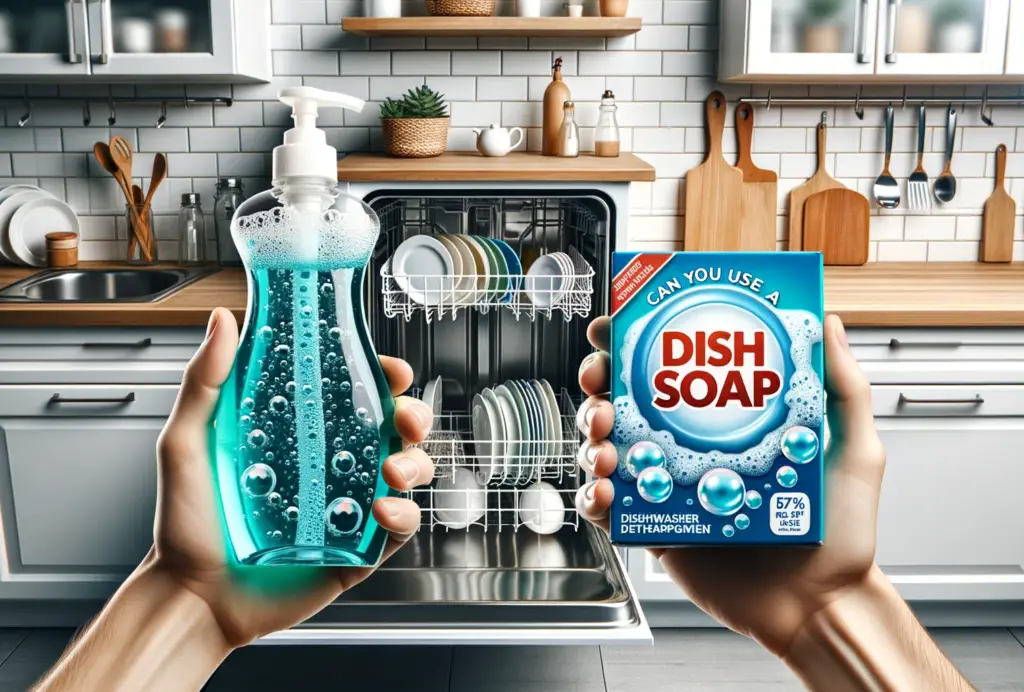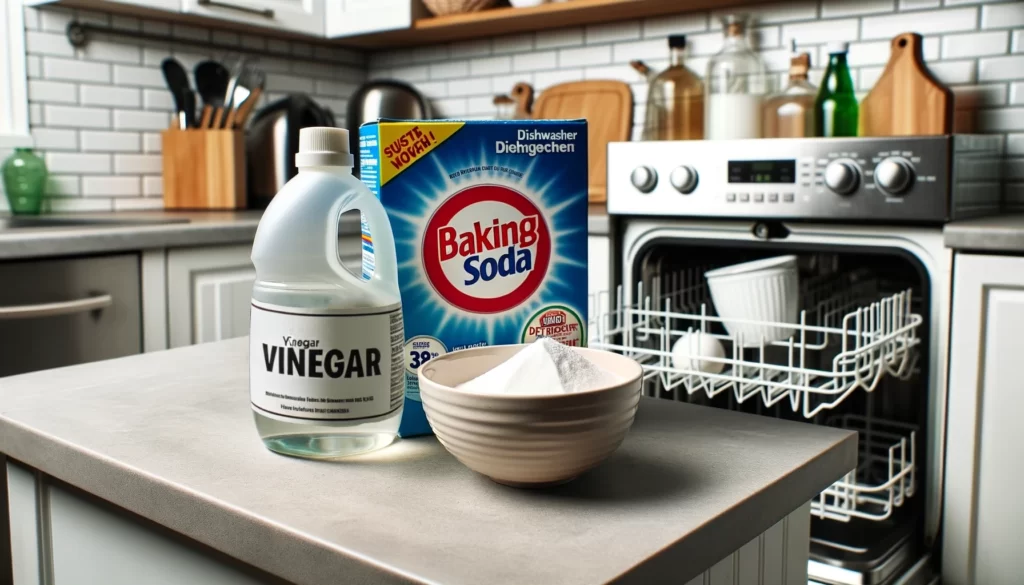Have you ever faced having a full load of dirty dishes to wash and an empty dishwasher detergent box?
Whether to substitute dish soap for dishwasher detergent has left many in a sudsy conundrum, sparking debates and myriad kitchen mishaps.
While it may seem like a quick fix, using dish soap in a dishwasher is a resounding no due to its high-sudsing formula that can lead to overflows and potential damage to the appliance.
Dive into this article to unravel the science behind this answer, explore detailed experiments, and discover safe and effective alternatives for those desperate dishwashing moments.
The Science Behind Dishwashing
Dish soap and dishwasher detergent serve distinct purposes in dishwashing, each formulated with specific cleaning scenarios in mind.
While dish soap produces a rich lather to tackle grease during hand-washing, dishwasher detergent is designed to provide optimal cleaning in automated dishwashers without generating excessive suds.
Formulation of Dish Soap
Dish soaps are formulated to generate a significant amount of suds and foam, which are crucial in suspending and removing dirt and grease during hand washing.
The high sudsing property is attributed to including surfactants, such as sodium lauryl sulfate, which effectively break down oils and lift away food particles from dishes. However, when introduced into the automated environment of a dishwasher, these suds pose a distinct problem.
Dish soap is optimized for manual dishwashing, where scrubbing, combined with the sudsy water, effectively cleans dishes. The formulation is gentle on the hands and effective in tackling grease and stuck-on food particles.
However, when a high-sudsing agent such as dish soap is used in a dishwasher, a machine designed for a no-suds detergent, the outcome can be less than perfect, as I discovered during my experiment.
Formulation of Dishwasher Detergent
Dishwasher detergents are scientifically prepared to produce minimal suds and foam.
This characteristic is crucial in preventing the overflow of foam within the confined space of the dishwasher, ensuring that the appliance operates efficiently and without burden.
Dishwasher detergents are designed to work in tandem with the mechanical actions of a dishwasher, ensuring dishes are cleaned and rinsed effectively without the need for physical scrubbing. The detergent is tasked with breaking down food particles and facilitating their removal while maintaining the integrity of the dishwasher by preventing excessive sudsing.
In dishwashing, suds are vital in removing dirt and oils. However, in an automated dishwasher, excessive suds can delay the cleaning process, block the water jets and prevent effective rinsing. Through experiments and data analysis, I will explain the impact of suds in a dishwasher, providing a clear view of why dishwasher detergents are low-sudsing.
What If I Put Dish Soap in the Dishwasher?
Can I Use Dish Soap Instead of Detergent in a Dishwasher?
The direct answer to the question “Can I use dish soap instead of detergent in dishwasher?” is “No”.
In practice, dish soap in a dishwasher can lead to overflows, leaks from the appliance, and flooding the kitchen floor. This is not just a theoretical scenario. It’s a proven result of numerous cases where a substitute has caused a sudsy debacle.
Using dish soap in a dishwasher is a huge mess that demands immediate attention. The excess foam spills onto the floor, necessitating a thorough cleanup to avert slips and falls. Moreover, the residual suds within the dishwasher require multiple rinse cycles to evacuate, consuming additional time and resources.

This immediate consequence underscores the significant difference in the sudsing properties between dish soap and dishwasher detergent, highlighting the potential risks and cleanup efforts involved in such a substitution.
Long-Term Effects of Using Dish Soap in the Dishwasher
With the long-term use of dish soap in the dishwasher, excess suds can infiltrate vital components, such as the pump and seals, potentially leading to damage and reduced operational efficiency over time.
Moreover, the experiment highlighted potential plumbing issues. The excess suds and foam can enter the plumbing system, potentially leading to blockages and disruptions in wastewater flow. This aspect, often overlooked, underscores the importance of considering the broader implications of our dishwashing choices, extending beyond the immediate mess and cleanup to potential plumbing repairs and interventions.
Is There a Difference Between Dishwasher Soap and Dish Soap?
Yes. Dishwasher detergent and dish soap have been formulated to meet different needs and functions. Understanding these distinctions is crucial in maintaining the efficiency of your cleaning routine and the longevity of your appliances.

Through years of experience, technicians and appliance experts have witnessed firsthand the consequences of using dish soap in dishwashers. A common consensus among professionals highlights some critical differences between dish soap and detergent:
- Chemical Composition: Dishwasher detergents are crafted with a blend of enzymes, surfactants, and other agents that work optimally in high temperatures and water hardness typical of dishwashers. In contrast, dish soaps are milder and designed for the gentleness required when hand-washing dishes.
- Suds Control: Dishwasher detergents produce minimal suds, a necessary characteristic to prevent foam overflow in machines. On the other hand, dish soaps create a high foam level suitable for soaking and scrubbing dishes manually.
With these differences, appliance brands and manufacturers have issued official guidelines stating that dish soap should never be substituted for dishwasher detergent. This unanimous stance is backed by research and product testing, ensuring appliance efficiency and longevity.
What Can I Use If I Run Out of Dishwasher Detergent?
“I’ve run out of dishwasher detergent. What can I use now?” This dilemma has a few practical solutions. While regular dish soap is not recommended, several alternatives can be used in an emergency.
In the absence of standard dishwasher detergent, some household items can serve as temporary substitutes:
- Baking Soda and Vinegar: A mixture of baking soda and vinegar can act as a replacement. This combination balances pH levels and aids in cleaning without leaving residues.
- Commercially Available Alternatives: Several eco-friendly detergents are effective and designed to be less harsh on your dishes and the environment.

However, these alternatives should only serve as short-term solutions until standard dishwasher detergent is available.
What to Do When You’ve Used Dish Soap?
If dish soap has been used in a dishwasher, immediate action is necessary to mitigate damage:
- Stop the Dishwasher: Halting the cycle prevents further soap suds overflow.
- Clean the Suds and Water: Remove the foam and water from the appliance using a wet-dry vacuum or towel.
- Run a Rinse Cycle: After cleaning, run a rinse cycle with the dishwasher empty to clear out any soap residue.
Myths and Misconceptions of Using Dish Soap
The topic of dishwashing is rife with myths and misconceptions that can lead to inefficient practices and potential damage to appliances.
Several myths need debunking for clarity:
- More Suds Equal Cleaner Dishes: This is a misconception. Excessive suds can leave a residue on dishes and impair machine performance.
- All Soaps Are the Same: A critical misunderstanding. The chemical composition of hand dish soap versus dishwasher detergent significantly differs, affecting their respective cleaning efficiencies.
Addressing misconceptions about dishwasher soap usage is essential because misconceptions often lead to mistakes resulting in faults in the dishwasher.
- One common error is believing that dish soap’s gentleness on hands translates to safety for dishwasher use. However, its high-foaming property is detrimental to machine operation.
- Another misconception is that increasing the amount of detergent will enhance cleaning power. This can cause residue build-up and impair appliance performance.
By understanding these truths, users can ensure they are adopting safe and effective dishwashing practices.
Conclusion
In conclusion, using dish soap in a dishwasher damages and leads to potential appliance damage due to excessive suds. The distinct formulations of dish soap and dishwasher detergent are not interchangeable, with misuse often rooted in common misconceptions.
While certain substitutes can temporarily replace dishwasher detergent in emergencies, they are absolutely in emergencies until proper supplies are restored.
Ultimately, understanding the science behind dishwashing and proper adherence to recommended practices ensures efficient, effective cleaning and preserves the integrity of our appliances.

James is an organic fertilizer professional who owns a successful organic fertilizer company in new jersey. He is an expert in waste management in both houses and community cases. In his free time, he loves to write about his experiences in the field.


2 thoughts on “Can You Use Dish Soap in a Dishwasher?”
Comments are closed.